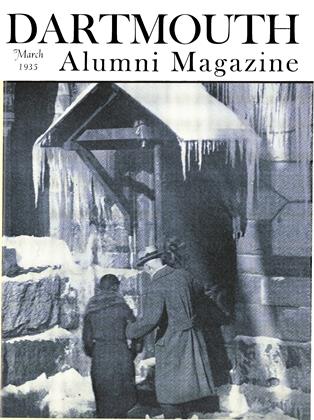THINKING BACK NEARLY fifteen years, we incline to be impressed with the number of things we didn't have in that precultural era. There ought to be a copybook maxim in that somewhere. What we were too crude or too naive to know about, we couldn t very well want. There were few automobiles in Hanover, almost no tea drinking, and no ping-pong tables or radios at all. And yet we were reasonably happy. A keg of beer, secreted in a senior society cellar, was an object of veneration to its own particular cult, and an item of cheerful gossip for the whole campus, which knew all about its coming and going.
Bill Sussdorf did have a car. So did Jimmy Reber, who could boast a very attractive wife as well. Chan Brown had a superengine of some sort mounted on a chassis which he called an automobile; and this ungodly creation could and did manage 65 miles an hour on the sandy stretch between Norwich and the Junk, to the dire peril of all involved in its operation.
Tea actually was served, so rumor had it, at the Sigma Chi House. The report brought both affirmations and denials. There was credible evidence that some of the brethren had advanced ideas on the subject, but debaters on the negative side argued that certain others of the brothersnotably Freddy Nolan, Pete Hurd and Cy Aschenbach—never would stand for it for a moment.
Lacking in general so many of the fruits of a more mature civilization, how was it that the boys amused themselves in the cool of the winter? There was basketball, for one thing. Although many watched, too few played for the good of the Big Green's reputation; in fact, through two dreary seasons of play there seems to have been but one man, Hoch Rau, who knew anything about the game at all. The crowd that straggled down to the Gym two or three nights a week could have had only two objectives: one, to see the team wrestle with a losing streak which mounted close to thirty before some miracle ended it; and the other, to watch Rau dribbling the ball round and round the floor, in and out among his bewildered opponents, forever dribbling but never locating another Dartmouth player to whom the ball could be passed.
One scene comes back to mind from a totally different kind of basketball, the inter class fracas. That belonged in a category all its own, like those free-for-alls where a bunch of scrappers are let loose in a ring together and anything goes. One picture comes back: 1919 and 1920 in mortal combat for the college championship. Zack Jordan, listed in the lineup as a guard, lies prone beneath the wrong basket, while the gentleman he is supposed to be guarding ambles complacently up the floor in possession of the ball. Zack rises in a fury, dashes headlong the length of the floor and fells his man with a diving tackle, just as the unwitting fellow is poised for the winning basket. The contest is called on accounting of pending bloodshed, and 1919 is adjudged the winner.
But we were speaking of the things we didn't miss. We shall be broad-minded and confess that one cultural asset we should have wanted, had we so much as suspected the possibility of its existence. We are thinking of the Baker Library. Who can remember with a shred of affection that squat hulk down on the corner toward New Hamp? Its very name eludes us. Within was an "octagon room," as complete a maze as it sounds, and there the spirit of literature could be, but rarely was, pursued. Even now we recall quite clearly the disbelief that crept over us when we learned that Mose Robinson and others, Hubey McDonough among them, sneaked down there at odd times and read books for the pure fun of it. The Autobiographyof Benvenuto Cellini was one of them. "Worth reading," they told us, but we never were convinced. It didn't seem possible that any book worth reading could be found in that musty labyrinth.
 View Full Issue
View Full Issue
More From This Issue
-
 Article
ArticleGraven Laycock: A Dartmouth Tradition
March 1935 By C. E. W. '30 -
 Article
ArticleHANOVER BROWSING
March 1935 By Herbert F. West '22 -
 Class Notes
Class NotesClass of 1914
March 1935 By C. Edward Leech -
 Class Notes
Class NotesClass of 1918
March 1935 By Allan C. Gottschaldt -
 Article
ArticleTwenty-Five Years Ago
March 1935 By Hap Hinman '10 -
 Class Notes
Class NotesClass of 1934
March 1935 By Martin J. Dwyer Jr.
R. M. Pearson '20
-
 Article
ArticleNot So Long Ago
October 1934 By R. M. Pearson '20 -
 Article
ArticleNot So Long Ago
April1935 By R. M. Pearson '20 -
 Article
ArticleNot So Long Ago
May 1935 By R. M. Pearson '20 -
 Article
ArticleNot So Long Ago
November 1935 By R. M. Pearson '20 -
 Article
ArticleNot So Long Ago
February 1936 By R. M. Pearson '20 -
 Article
ArticleNot So Long Ago
June 1936 By R. M. Pearson '20







